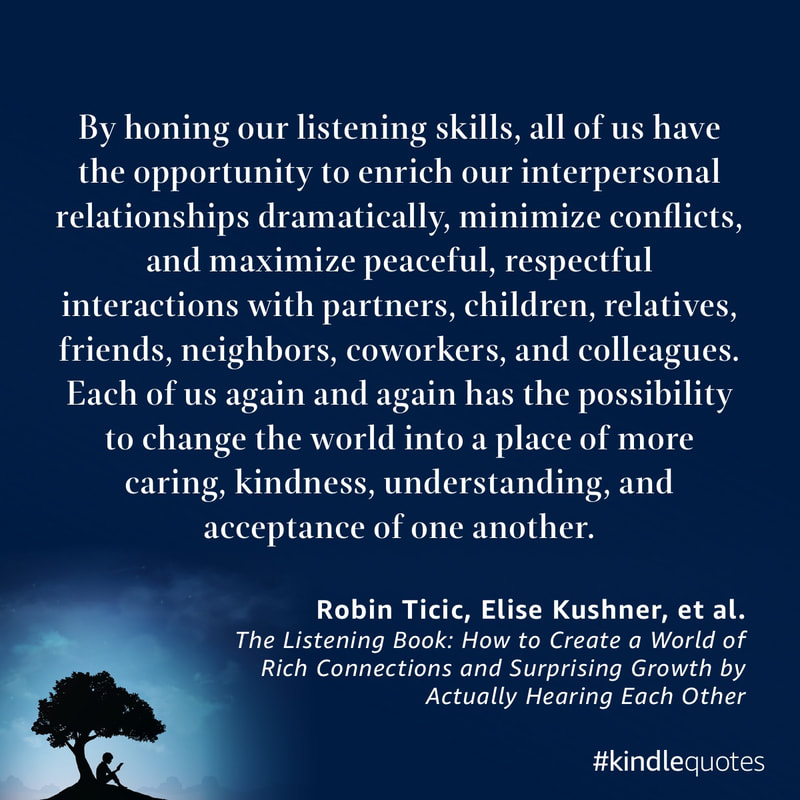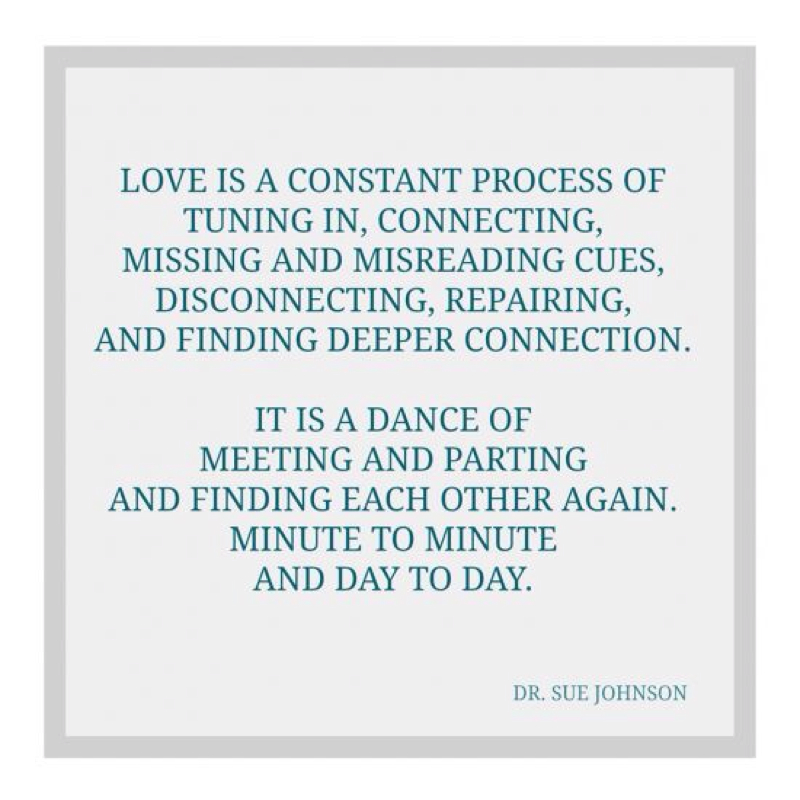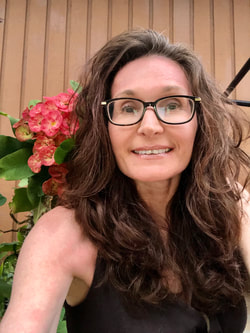|
It is not complex. We never know what another person is going through or what they have been through and how impactful just listening can be on a person's self esteem. It makes folks feel seen, important and maybe even loved.
0 Comments
Dr. Sue Johnson & EVRYMAN co-founder Owen Marcus discuss how to use science to on the transform your relationship. Dr. Sue Johnson is a clinical psychologist, researcher, professor, author, speaker. She is one of the leading innovators in the field of couple therapy. Most of her research focuses on the efficacy of Emotionally Focused Couple Therapy (EFT), a therapy she developed more than 30 years ago. It’s acknowledged as the gold standard in tested, proven interventions for couples. She is the author of numerous articles and books, including Love Sense and Created for Connection, and Hold Me Tight, which she has developed into an online course for couples.
 Yup. It totally happened to me. Before I knew it I was slimed. It happened at yoga, which really threw me off. I went to a crowded yoga class, and this person would not move their mat so I could get in. I even asked the individual in question to move so I could fit in. They moved all right! In a manner that made it even more difficult for me to fit in. My very sweet and nice yoga teacher stepped in and moved her mat totally off the floor so I could practice. Unfortunately, the sliming had already taken place. I was angry and took on a foul mood. So what the heck is being slimed anyway? My definition of being slimed, not a very technical word but you get the drift, is when you let someone else's bad energy, words, mood, attitude, or behavior totally take over your disposition and ruin your moment, your day, even your life. More clinically I think this would fall into the category of intrapersonal and interpersonal boundaries and how they intersect. Why does this happen to us and why so fast? I believe it is a flight or fight thing. It happens when we perceive threat. I think it is because we all have internal values and boundaries from our upbringing and culture. When those values get crossed we go into protection mode. I have a strong internal value around being polite. I was taught to say please and thank you growing up. As well, I was encouraged to share. When I think someone has crossed what I perceive as appropriate, I react. I perceive rudeness and take that energy on internally. But, I have choices. So, what can I, we, and you do about it? Well, first be aware that it happens. We sometimes let other people affect us and in some not so good ways. Second, we can also work hard to not assume the other is trying to threaten us or do us "wrong." There is no way to know what is going on with others unless we ask and they tell us. Most behaviors have an explanation. Most people have a story. Other things we can do are to talk to a buddy who understands us (I did this), or forgive the offending person for offending and yourself for reacting. Finally, we can remember, being human, we've probably slimed someone else without being aware of it. However, if this is a chronic reactive state, you may want to look at yourself and reflect on what is making you be so reactive. Are you overworked, stressed, or feeling generally unsupported in life? Ask yourself, "Who am I and what does this reaction say about me right now?" And importantly, if another person repeatedly acts in concrete ways that you perceive as disrespectful, you may have to decide whether or not talking to that person about the problem is warranted. Talking it out takes courage, but you'd be surprised at how healing it can be.  Professional counselors will tell you that one of the most important relationship skills they teach is active listening. Often people get into trouble in their relationships because they have not developed their ability to listen and communicate. However, one can learn to step out of reactivity and listen deeply and lovingly. This is a great gift to self and to family and friends. Barriers to Effective Communication There are some good reasons why many people are less-than-effective communicators. These are the most common reasons: • Lack of skill; not knowing how • Not taking the time to think through what one wants to say • Not taking the time to anticipate what another person might be thinking and feeling • Fear of revealing too much of oneself • Being afraid of another person’s anger • Not wanting to hurt another person’s feelings Four Key Listening Skills Listening skills are the building blocks of effective communication. These skills enable you to demonstrate that you are interested in what the other person has to say, as well as hearing and understanding the other person. Four key listening skills are open-ended questions, summary statements, reflective statements, and neutral questions and phrases. They are easy to learn with a little practice. Open-ended questions begin with what, why, how do, or tell me.
 The most basic connection response is "Keeping Company:" the art of being a tenderhearted witness who listens attentively and compassionately to your own or someone else's feelings without saying how to feel or what to do. Keeping company with someone means being fully heart-present to them in ways that encourage them to explore, resolve and learn from their inner reactions. (Eugene Gendlin, the originator of an extremely important discernment development tool called Focusing, coined the term "keeping company.") ~David Gruder, Ph.D, The New I.Q. "Happiness is the only thing that multiples when you share it." ~Albert Schweitzer, a German physician and Nobel Peace Prize winner.
Several years ago I started having severe pain in my neck and shoulder. I have some disk issues in my neck, which a steroid shot seemed to help. But my shoulder problem had been pretty unresponsive to convention medicine. My pain was chronic and often a 10 on the subjective units of distress scale.The culprit: bone spurs. I really was not up to even thinking about surgery. So, the physical therapist recommended strengthening my upper body. To a girl who never has even tried to do a push up, this did not sound very fun. No, not at all. But, I had to do something. My solution was to start Vinyasa yoga at Xplore Yoga. This type of yoga has many upper body strengthening postures. It was perfect for my goals. And now, I am happy to say that after just over a year of practicing I am completely pain free in my shoulder. Being out of pain is great but the really cool and fun part about all of this is that I can do all kinds of things I never ever dreamed of doing at my age. Several months ago I accomplished dolphin forearm stand for the first time. I was so excited and happy and shocked that I could do this pose, I got a fellow yogi to take a picture of me in the posture and stared sharing it with just about anybody who was willing to look at it. I was so happy. Then a funny thing started to happen. Even though everyone I shared with was genuinely happy for me in my accomplishments after my excitement died down, I started to feel this slight awkward feeling of, "Oh God. Have I shared too much of my happiness? Maybe I should have kept my joy to myself? People probably don't really want to know about this." Whoops. Too late. Today I learned from a listserv I am on that a study showed that sharing our joy or happiness is good for everybody as long as there is positive feedback. It may even cause the joy to multiple. A colleague shared a recent study by Nathaniel Lambert and colleagues at Brigham Young University as to why this may be. Their research shows that discussing positive experiences leads to heightened well-being, increased overall life satisfaction and even more energy. The Atlantic publishes good article summarizing John Gottman's research suggesting that kindness is a as key factor in successful relationships. Check it out!
 Poem by one of my Yoga Teachers Kiara McBain. It is profound. Tonight I realized life is clean and simple a mere blank canvas on which to create it's people that make life complicated the mess of another makes a mess of our own life I wanted to swear to stay away from broken hearts and broken people but the hard truth is very few sort out their demons very few know themselves enough to live honestly and very few look at life as an opportunity to learn so it is our job to love the messy landscape of humanity as if adoring a sunset with all its bleeding lines lack of definition and gleaming imperfections |
Evelyn Schmechtig CochranCategories
All
Archives
February 2024
|




















